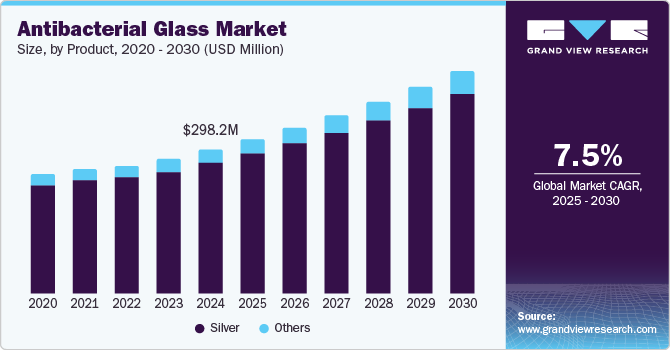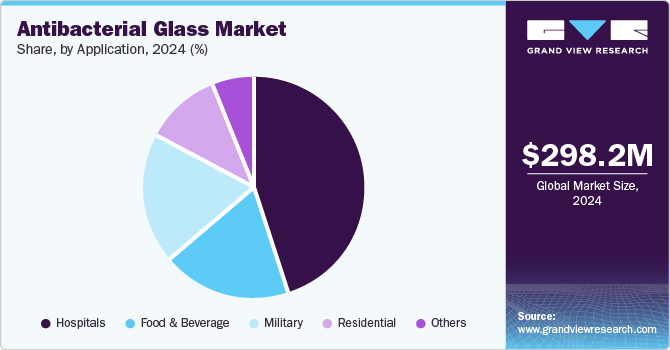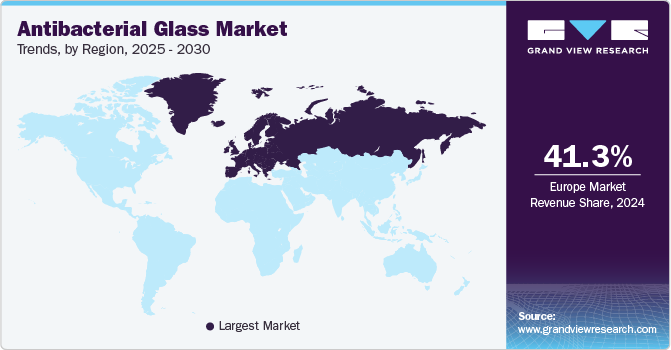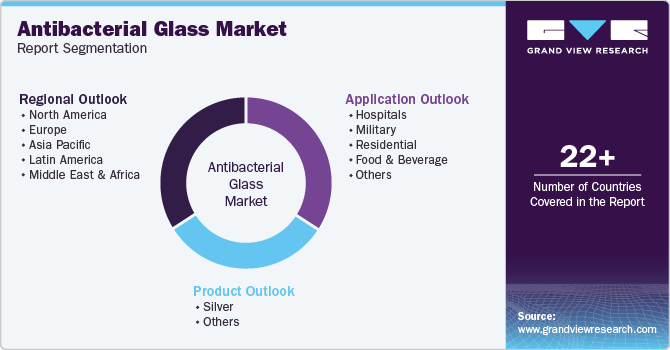- Home
- »
- Specialty Glass, Ceramic & Fiber
- »
-
Antibacterial Glass Market Size, Share, Industry Report, 2030GVR Report cover
![Antibacterial Glass Market Size, Share & Trends Report]()
Antibacterial Glass Market (2025 - 2030) Size, Share & Trends Analysis Report By Product (Silver, Others), By Application (Hospitals, Military, Residential, Food & Beverage), By Region (North America, Asia Pacific, Europe), And Segment Forecasts
- Report ID: 978-1-68038-015-6
- Number of Report Pages: 100
- Format: PDF
- Historical Range: 2018 - 2023
- Forecast Period: 2025 - 2030
- Industry: Advanced Materials
- Report Summary
- Table of Contents
- Interactive Charts
- Methodology
- Download FREE Sample
-
Download Sample Report
Antibacterial Glass Market Size & Trends
The global antibacterial glass market size was estimated at USD 298.2 million in 2024 and is projected to grow at a CAGR of 7.5% from 2025 to 2030. With increasing awareness of hygiene and the rising incidence of healthcare-associated infections (HAIs), there has been an increased demand for antimicrobial solutions across healthcare, food, and public environments. The healthcare industry is particularly focused on using antibacterial glass to reduce infection risks in hospitals, clinics, and laboratories.

In addition, the surge in consumer electronics usage, particularly smartphones and tablets, has boosted the demand for antibacterial glass as hygiene concerns grow. Technological innovations, such as silver-based coatings, have enhanced the glass's antibacterial properties, making it more effective. Furthermore, strict regulatory requirements promoting cleanliness and safety in the healthcare and food sectors are driving market expansion. The broader use of antibacterial glass in public spaces such as schools and transportation hubs is also contributing to the growing demand.
Food processing companies must adhere to strict regulations ensuring cleanliness and preventing contamination to protect employees and consumers. These requirements have become more stringent following the pandemic. Many companies are now adopting antimicrobial glass to reduce microbial contamination on floors and equipment to meet hygiene standards. This growing trend contributes positively to the expansion of the global antimicrobial glass market as businesses prioritize sterilization and safety.
Product Insights
The silver-based antibacterial glass dominated the market and accounted for a revenue share of 90.4% in 2024. Silver ions in antimicrobial glass exhibit antibacterial properties by eliminating 99% bacteria and limiting fungal growth. Silver ions are infused into the surface during production, disrupting bacterial division and killing them. This silver-based glass is particularly effective in humid, warm regions and protects against bacteria such as Escherichia coli, Pseudomonas aeruginosa, and Staphylococcus aureus, as well as fungi such as Aspergillus niger and Candida albicans. Its use is expected to rise globally.
The 0thers segment is expected to grow at a CAGR of 8.5% over the forecast period. Other active ingredients include silicon, copper, zinc oxide, manganese, and titanium. Copper-based antibacterial glass protects against bacteria by destroying them. Zinc ions can disrupt bacterial membranes and enzymes, preventing bacterial growth. Titanium and titanium dioxide are often used in photocatalytic antibacterial glass. When exposed to light, titanium dioxide generates reactive oxygen species (ROS) that kill bacteria and other pathogens. It is often used in self-cleaning surfaces. Manganese compounds can help prevent microbial colonization on glass surfaces.
Application Insights
Hospitals dominated the antibacterial glass market with a revenue share of 45.4% in 2024 due to stringent regulations regarding hygiene and safety in hospitals and increasing spending on the healthcare sector across various countries. Antibacterial glass offers long-lasting protection against microbial growth without needing frequent reapplication. It's particularly effective in high-touch areas such as door handles and nurse call buttons, reducing pathogen spread and cross-contamination. Though initially more costly, it saves money by lowering cleaning needs, preventing infections, and reducing the costs of extended patient stays, HAIs, and potential lawsuits.

The military segment in the antibacterial glass market is expected to grow at the fastest CAGR of 7.7% over the forecast period. Military personnel operate in environments with limited sanitation, increasing infection risks. Antibacterial glass helps reduce microbial growth on surfaces in vehicles, tents, and equipment, providing extra protection. It also benefits military medical units and field hospitals by reducing the spread of hospital-acquired infections (HAIs), essential for maintaining soldiers' health in combat zones with limited medical resources.
Regional Insights
North America Antibacterial Glass Market Trends
North America antibacterial glass market held a substantial market share in 2024. North American regulations promoting higher hygiene standards in hospitals, public spaces, and schools drive the use of antibacterial glass to reduce pathogen spread. The booming construction and renovation market has increased demand for antibacterial glass in high-touch areas prone to contamination. Innovations in antimicrobial coatings and glass manufacturing have made antibacterial glass more effective, durable, and affordable, boosting its adoption.
U.S. Antibacterial Glass Market Trends
The antibacterial glass market in the U.S. dominated the North America market, with the highest revenue share in 2024. The growth of hospitals, medical centers, and healthcare facilities increases the need for antibacterial glass to prevent hospital-acquired infections (HAIs) and maintain cleaner environments. As businesses, homeowners, and the real estate sector prioritize cleanliness and safety, the demand for antibacterial glass has risen. The growing focus on hygiene in public transportation systems, such as buses, trains, and airports, drives the adoption of antibacterial glass for surfaces that come into frequent contact with passengers.
Europe Antibacterial Glass Market Trends
Europe antibacterial glass market dominated the global market, with a revenue share of 41.3% in 2024. This is due to increasing healthcare spending, better personal and private hygiene practices among the population, and stringent regulations imposed on manufacturing facilities and hospitals. Its use is also expanding in commercial spaces such as offices, airports, hotels, and public transport to maintain cleanliness and prevent pathogen spread. The growing construction sector in Europe boosts demand for antibacterial glass in new buildings and renovations, especially in high-touch areas.

Germany antibacterial glass industry dominated the Europe market with the largest revenue share in 2024. Germany's robust healthcare infrastructure has increased demand for antibacterial glass in hospitals, clinics, and medical facilities to prevent hospital-acquired infections (HAIs) and improve hygiene. Strict regulations and hygiene standards in healthcare and public spaces drive the adoption of antibacterial materials, including glass, to ensure safer environments. As the construction sector in Germany grows, there is an increased demand for antibacterial glass in new buildings, particularly for high-touch surfaces in commercial, residential, and public spaces.
Asia Pacific Antibacterial Glass Market Trends
The Asia Pacific antibacterial glass industry is expected to grow significantly at a CAGR of 7.5% over the forecast period. The rapid expansion of cities and infrastructure development in its countries increases demand for antibacterial glass in new buildings, particularly in high-touch areas such as offices, malls, and public transportation. The increasing number of hospitals, clinics, and medical facilities in emerging economies such as India and China drives the need for antibacterial glass. Stringent hygiene standards and building regulations in healthcare, commercial, and public sectors are pushing the adoption of antimicrobial materials, including antibacterial glass, to improve public safety.
The antibacterial glass market in China led the Asia Pacific market with the largest revenue share in 2024. China’s ongoing urban expansion and large-scale infrastructure projects drive demand for antibacterial glass in new buildings. Increased awareness of hygiene and infection control, amplified by the COVID-19 pandemic, has led to a surge in demand for antibacterial solutions in public spaces, hospitals, schools, and commercial buildings to minimize the spread of pathogens. The Chinese government's emphasis on enhancing health and safety standards in public and healthcare sectors promotes the use of antimicrobial materials, such as antibacterial glass, to meet hygiene regulations.
Key Antibacterial Glass Company Insights
Some key antibacterial glass market companies include AGC Inc., Corning Incorporated, Guardian Industries Holdings Site, ISHIZUKA GLASS CO.,ltd., and others. Strategic partnerships with construction firms, architects, hospital networks, and technology providers enable companies to expand their reach. Companies offer customizable solutions or diverse product lines tailored to various industries. As online shopping and direct-to-consumer models grow, companies with strong e-commerce platforms and digital marketing strategies are expanding their reach to new customers and geographic regions.
-
AGC Inc. develops cutting-edge technologies such as antimicrobial glass, eco-friendly glass solutions, and advanced materials for the automotive and electronics sectors. The company integrates antimicrobial technologies into its glass products, making them resistant to bacterial growth. This technology is especially used in healthcare, construction architecture, and the automotive industry.
-
Corning Incorporated is a technology company specializing in developing and manufacturing specialty glass, ceramics, and advanced materials. Its products are particularly relevant for high-traffic, high-touch areas such as hospitals, schools, public transportation, and commercial spaces, where reducing microbial growth is critical.
Key Antibacterial Glass Companies:
The following are the leading companies in the antibacterial glass market. These companies collectively hold the largest market share and dictate industry trends.
- AGC Inc.
- Corning Incorporated
- Guardian Industries Holdings Site
- ISHIZUKA GLASS CO.,ltd.
- Kastus Technologies Company Limited
- Nippon Sheet Glass Co., Ltd
- Saint Gobain
- Schott AG
- Smartglass International
- SUMITA OPTICAL GLASS, Inc.
Recent Developments
-
In December 2024, AGC Inc. announced that it is preparing for major leadership changes, with new nominations for its Board of Directors and Audit & Supervisory Board, subject to shareholder approval in March 2025. A key appointment includes Koji Arima from DENSO Corporation as a new Director. These leadership adjustments are part of AGC’s efforts to enhance its governance and leadership capabilities.
-
In June 2024, Corning Incorporated introduced Gorilla Glass 7i, enhancing durability for mid-range smartphones. It offers improved drop protection, surviving drops up to one meter onto rough surfaces, and is twice as scratch-resistant as competing glasses.
Antibacterial Glass Market Report Scope
Report Attribute
Details
Market size value in 2025
USD 319.9 million
Revenue forecast in 2030
USD 458.8 million
Growth Rate
CAGR of 7.5% from 2025 to 2030
Base year for estimation
2024
Historical data
2018 - 2023
Forecast period
2025 - 2030
Quantitative units
Revenue in USD million and CAGR from 2025 to 2030
Report coverage
Revenue forecast, company ranking, competitive landscape, growth factors, and trends
Segments covered
Product, application, region
Regional scope
North America; Europe; Asia Pacific; Latin America; MEA
Country scope
U.S.; Canada; Mexico; Germany; UK; France; China; Japan; India; Brazil
Key companies profiled
AGC Inc.; Corning Incorporated; Guardian Industries Holdings Site; ISHIZUKA GLASS CO.,ltd.; Kastus Technologies Company Limited; Nippon Sheet Glass Co., Ltd; Saint Gobain; Schott AG; Smartglass International; and SUMITA OPTICAL GLASS, Inc.
Customization scope
Free report customization (equivalent up to 8 analysts working days) with purchase. Addition or alteration to country, regional & segment scope.
Pricing and purchase options
Avail customized purchase options to meet your exact research needs. Explore purchase options
Global Antibacterial Glass Market Report Segmentation
This report forecasts revenue growth at global, regional, and country levels and analyzes the latest industry trends in each sub-segment from 2018 to 2030. For this study, Grand View Research has segmented the global antibacterial glass market report based on product, application, and region.

-
Product Outlook (Revenue, USD Million; 2018 - 2030)
-
Silver
-
Others
-
-
Application Outlook (Revenue, USD Million; 2018 - 2030)
-
Hospitals
-
Military
-
Residential
-
Food & Beverage
-
Others
-
-
Regional Outlook (Revenue, USD Million; 2018 - 2030)
-
North America
-
U.S.
-
Canada
-
Mexico
-
-
Europe
-
Germany
-
France
-
UK
-
-
Asia Pacific
-
China
-
India
-
Japan
-
-
Latin America
-
Brazil
-
-
Middle East & Africa
-
Share this report with your colleague or friend.
Need a Tailored Report?
Customize this report to your needs — add regions, segments, or data points, with 20% free customization.

ISO 9001:2015 & 27001:2022 Certified
We are GDPR and CCPA compliant! Your transaction & personal information is safe and secure. For more details, please read our privacy policy.
Trusted market insights - try a free sample
See how our reports are structured and why industry leaders rely on Grand View Research. Get a free sample or ask us to tailor this report to your needs.










